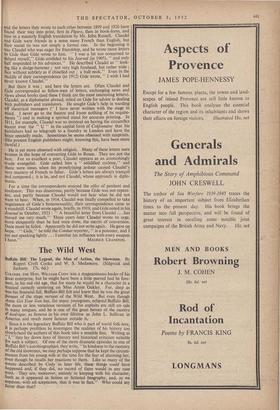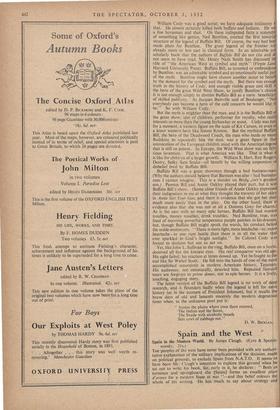The Wild West
COLONEL THE HON. WILLIAM CODY was a magnanimous leader of his great enterprise, but he might have been a little peeved had he fore- seen, in his sad old age, that for many he would be a character in a Musical comedy centering on Miss Annie Oakley. For, deep as Was his financial fall, Buffalo Bill felt and knew that he was the great Pioneer of the stage version of the Wild West. But even though Annie Get Your Gun has, for many youngsters, eclipsed Buffalo Bill, the more or less veracious versions of his exploits are still on sale in many tongues, and he is one of the great heroes of the matiere d'Amerigue, as famous in his own- lifetime as John L. Sullivan in America and much more famous outside' it.
Since it is the legendary Buffalo Bill who is part of world folk-lore, it is perhaps profitless to investigate the realities of his history too closelypand the authors of this book take a sensible line. Writing as "I," they lay down laws of literary and historical criticism suitable for such a subject. Of one of the more dramatic episodes in one of Buffalo Bill's autobiographies`, they write, "In kindness to the memory Of the old showman, we may perhaps suppose that he kept the circum- stances from his young wife at the time for the fear of alarming her, even though he recalls her reactions to them. Like so many of the events described by Cody in later life, these things could have happened and, if they did, no record of them would in any case exist. They are, moreover, entirely in keeping with his character, both as it appeared in fiction or fictional biography, and, as we suppose, with all scepticism, that it was in fact." Who could say fairer than that? William Cody was a good scout; we have adequate testimony that. He almost certainly killed both buffalo and Indians. He w a fine horseman and shot. On these indisputed facts a scound of something like genius, Ned Buntline, erected the first towerin structure of the legend of Buffalo Bill. Of course, the way had bee made plain for Buntline. The great legend of the frontier w already more or less cast in classical form. In an admirable an scholarly book that the authors of Buffalo Bill do not cite and d not seem to have read, Mr. Henry Nash Smith has discussed t role of the American West as symbol and myth" (Virgin Lan Harvard University Press). Buffalo Bill, as invented or embroidere by Buntline, was an admirable symbol and an emotionally useful pa of the myth. Buntline might have chosen another scout to bencf
by the demand for the symbol and the myth. But there was enoug truth in the history of Cody, and enough visible grace and skill i the hero of the great Wild West Show, to justify Buntline's choic It is not enough simply to dismiss Buffalo Bill as a mere beneficia of skilled publicity. As Jacques Bainville said of Boulanger, No everybody can become a hero of the cafe concerts he would like t be." So with William Cody. But the myth is mightier than the man, and it is the Buffalo Bill o the great show, idol of children, performer for royalty, who mall interests us more than the young Jayhawker or scout. Cody was not for a moment, a western figure on the scale of Kit Carson, or even o a lesser western hero like Simon Kenton. But the mythical Buffal Bill, he hero of the Deadwood Coach, the man who made so man Redskins so repeatedly bite the dust, was a great figure in that intoxication of the European childish mind with the American legend that is still so potent. In Europe, the Wild West show was no ficti' tious invention. That is what America was like. That is what it is like for children of a larger growth. William S. Hart, Roy Rogers, Destry, Sulky Sam Snake—all benefit' by the willing suspension o disbelief bred by Buffalo Bill.
Buffalo B:11 was a great showman though a bad business-man. (Why the authors should believe that Barnum was also P. bad business- man I cannot imagine. This is a slander on Bridg ,dort's greatest son.) Pawnee Bill and Annie Oakley played their part, but it was Buffalo Bill's show. (Some close friends of Annie Oakley expressed their indignation to me at what they thought the travesty of her story in Annie Get Your Gun, and there is evidence that she got her man much more easily than in the play. On the other hand, there is evidence also that she was not at all a Dolores Grey for charm.) As is the case with so many epic heroes, Buffalo Bill had women troubles, money troubles; drink troubles. Ned Buntline, true, was fond of inserting powerful temperance purple patches in his dramas, but, though Buffalo Bill might speak the words, his conduct belied the noble sentimmts. "There is more fight, more headache—ay, more heartache—in one rum bottle than there is in all the water that ever sparkled in God's bright sunlight." So Colonel Cody was forced to declaim but not to act on.
Yet, like John L. Sullivan in the ring, Buffalo Bill, once on a horse, deceived all but the keenest eyes. His real conqueror was old age. His sight failed; his reaction at times slowed up. Yet he fought to the end like Sir Wafter Scott. He fell into the hands of one of the most accomplished scoundrels in modern American history, Tamman. His audiences, not unnaturally, deserted him. Repeated farewell tours are forgiven to prime donne, not to epic heroes. It is a lively, touching, engaging story.
The latest version of the Buffalo Bill legend is no work of deep research, and it flounders badly when the legend is left for mere history (as in the account of President Johnson), but it recalls the brave days of old and laments sincerely the modern degenerate times when, as the unknown poet put it: " Across the plains where once there roamed, The Indian and the Scout, The Swede with alcoholic breath Sets rows of cabbage out."
D. W. BROGAN.



















































 Previous page
Previous page